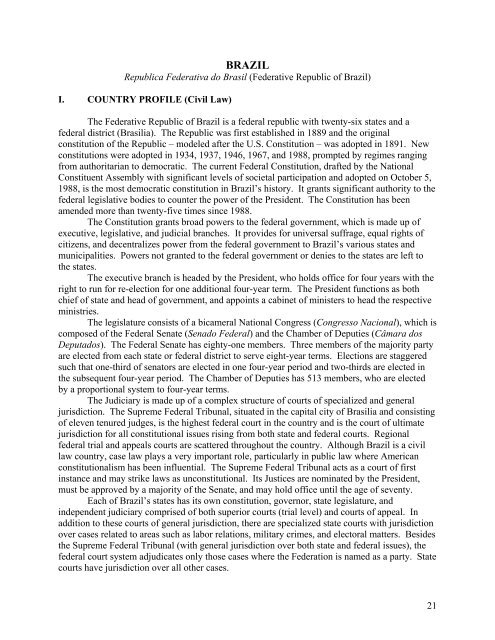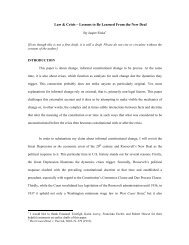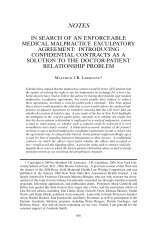Guide to Foreign and International Legal Citations - New York ...
Guide to Foreign and International Legal Citations - New York ...
Guide to Foreign and International Legal Citations - New York ...
Create successful ePaper yourself
Turn your PDF publications into a flip-book with our unique Google optimized e-Paper software.
BRAZIL<br />
Republica Federativa do Brasil (Federative Republic of Brazil)<br />
I. COUNTRY PROFILE (Civil Law)<br />
The Federative Republic of Brazil is a federal republic with twenty-six states <strong>and</strong> a<br />
federal district (Brasilia). The Republic was first established in 1889 <strong>and</strong> the original<br />
constitution of the Republic – modeled after the U.S. Constitution – was adopted in 1891. <strong>New</strong><br />
constitutions were adopted in 1934, 1937, 1946, 1967, <strong>and</strong> 1988, prompted by regimes ranging<br />
from authoritarian <strong>to</strong> democratic. The current Federal Constitution, drafted by the National<br />
Constituent Assembly with significant levels of societal participation <strong>and</strong> adopted on Oc<strong>to</strong>ber 5,<br />
1988, is the most democratic constitution in Brazil’s his<strong>to</strong>ry. It grants significant authority <strong>to</strong> the<br />
federal legislative bodies <strong>to</strong> counter the power of the President. The Constitution has been<br />
amended more than twenty-five times since 1988.<br />
The Constitution grants broad powers <strong>to</strong> the federal government, which is made up of<br />
executive, legislative, <strong>and</strong> judicial branches. It provides for universal suffrage, equal rights of<br />
citizens, <strong>and</strong> decentralizes power from the federal government <strong>to</strong> Brazil’s various states <strong>and</strong><br />
municipalities. Powers not granted <strong>to</strong> the federal government or denies <strong>to</strong> the states are left <strong>to</strong><br />
the states.<br />
The executive branch is headed by the President, who holds office for four years with the<br />
right <strong>to</strong> run for re-election for one additional four-year term. The President functions as both<br />
chief of state <strong>and</strong> head of government, <strong>and</strong> appoints a cabinet of ministers <strong>to</strong> head the respective<br />
ministries.<br />
The legislature consists of a bicameral National Congress (Congresso Nacional), which is<br />
composed of the Federal Senate (Senado Federal) <strong>and</strong> the Chamber of Deputies (Câmara dos<br />
Deputados). The Federal Senate has eighty-one members. Three members of the majority party<br />
are elected from each state or federal district <strong>to</strong> serve eight-year terms. Elections are staggered<br />
such that one-third of sena<strong>to</strong>rs are elected in one four-year period <strong>and</strong> two-thirds are elected in<br />
the subsequent four-year period. The Chamber of Deputies has 513 members, who are elected<br />
by a proportional system <strong>to</strong> four-year terms.<br />
The Judiciary is made up of a complex structure of courts of specialized <strong>and</strong> general<br />
jurisdiction. The Supreme Federal Tribunal, situated in the capital city of Brasilia <strong>and</strong> consisting<br />
of eleven tenured judges, is the highest federal court in the country <strong>and</strong> is the court of ultimate<br />
jurisdiction for all constitutional issues rising from both state <strong>and</strong> federal courts. Regional<br />
federal trial <strong>and</strong> appeals courts are scattered throughout the country. Although Brazil is a civil<br />
law country, case law plays a very important role, particularly in public law where American<br />
constitutionalism has been influential. The Supreme Federal Tribunal acts as a court of first<br />
instance <strong>and</strong> may strike laws as unconstitutional. Its Justices are nominated by the President,<br />
must be approved by a majority of the Senate, <strong>and</strong> may hold office until the age of seventy.<br />
Each of Brazil’s states has its own constitution, governor, state legislature, <strong>and</strong><br />
independent judiciary comprised of both superior courts (trial level) <strong>and</strong> courts of appeal. In<br />
addition <strong>to</strong> these courts of general jurisdiction, there are specialized state courts with jurisdiction<br />
over cases related <strong>to</strong> areas such as labor relations, military crimes, <strong>and</strong> elec<strong>to</strong>ral matters. Besides<br />
the Supreme Federal Tribunal (with general jurisdiction over both state <strong>and</strong> federal issues), the<br />
federal court system adjudicates only those cases where the Federation is named as a party. State<br />
courts have jurisdiction over all other cases.<br />
21
















